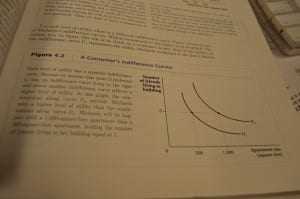The death of leadership

Putting common markets over common dreams
The world today is a confusing, dreary place. All the economic trends, especially for those of employment, suggest that the most we have to look forward to is a future of part-time low-wage work. This future is twinned with one where the cost of living – the price you pay for things such as bread, a house, water and transport – will continue to increase. In countries truly ravaged by this situation, such as Greece and Spain, there have been serious instances of unrest, the most visible symbol of which was the election of parties that were formerly on the outside of the mainstream. How, then, do our leaders respond? By staying the course. Stephen Harper continues on his trade-deal extravaganza and balanced-budget mania. German Chancellor Angela Merkel continues to insist that all Eurozone countries stick to a deficit-to-GDP ratio of 3%. They do this despite growing protests over these courses of action. Why? I would argue that it is because in an era marked by neoliberalism, we no longer have leaders; we have only managers.
Neoliberalism can be best described as the idea that structuring life as a series of market exchanges would create the optimum society. Since 1980, this philosophy has more or less defined the background of all major political debate in the world. Governments of both left and right began to relate to their citizens as firms relate to their consumers. The implications for this shift meant a profound difference in how leaders acted to solve national problems. In his last book Ill Fares the Land, British historian Tony Judt noted that political debates tended to have a moral quality to them with issues such as unemployment and social cohesion taking the fore. Today by contrast, unemployment takes second place to reviving business confidence.
Although many economic commentators write that global demand and growth is shrinking, austerity policies are not likely to disappear anytime soon. The reason for this is that if you view life through a market lens, you view social problems as being market failures. In the wake of the 2008 financial crash, the preferred solution adopted by Western governments has been to engage in quantitative easing (QE), a euphemism for mass bond-purchasing. This was done in order to ease banks’ debt burdens and hopefully to raise business confidence. While viewed as a temporary measure, QE continued until 2014 and is still going; the EU is expected to start it while America plans to stop it. All this while, the employment situation confronting youth is grim. Despite repeated reports that the workforce is becoming a more hostile place for workers, governments are refusing to enact policies of yore such as deficit spending and strengthening employment protections. While acknowledging problems exist with the current policies, governments insist that there are no alternatives to them. Instead, they ready themselves for crushing protests. According to the Guardian, the Spanish government ordered more police equipment to deal with anticipated mass demonstrations. It increasingly seems that governments view their role as managing economies rather than uniting people. Behind their logic is a body of thought that reduces people to a bundle of skills that only obtains value when it is employed at minimum cost to the employer. Meanwhile, any effort to promote a common good life amongst the people, with low unemployment and poverty, is shunned because it costs businesses too much.
I believe that our governments are too attached to the idea of promoting economic liberty above everything else. Individualism went hand in hand with the fraying of old social ties on the grounds that they restricted an individual’s true aspirations. Yet as more individuals find themselves in poverty, they are starting to realize the folly of individualism. Unfortunately, governments seem unwilling to engage with people as citizens. Forty years of viewing governance as mere economic management has left them unable to relate to people not representing businesses.










